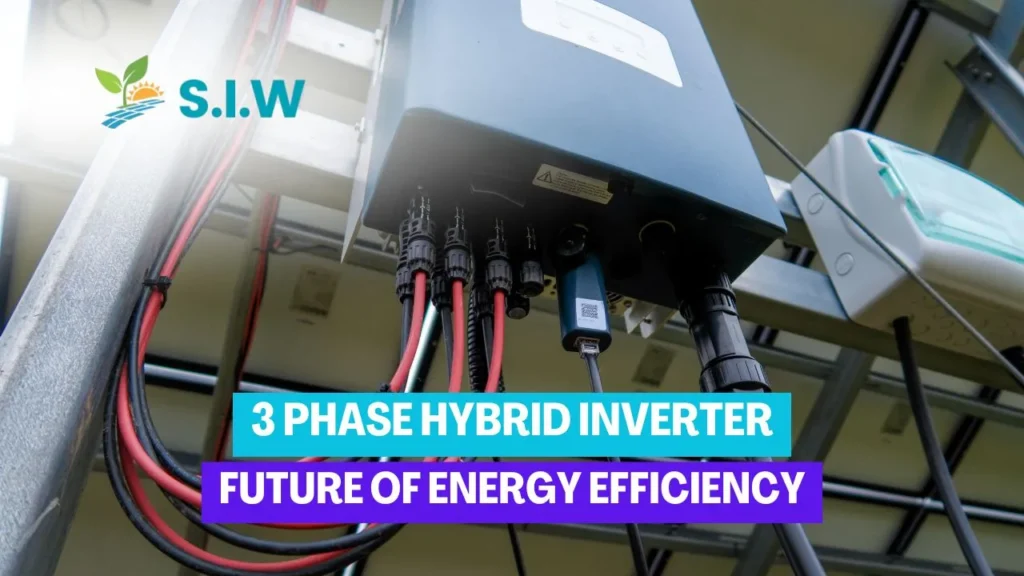In a world where energy efficiency is key, the 3 phase hybrid inverter is becoming an integral part of modern energy systems. But what exactly is a 3 phase hybrid inverter, and why is it important? This article will guide you through its role in power distribution, its advantages, and how it plays a vital role in integrating renewable energy sources into our homes and businesses.
Understanding 3 Phase Power
Basics of 3-Phase Power Systems
A 3-phase power system is a method of distributing electricity using three alternating currents. It offers more efficient power distribution than single-phase systems, making it ideal for high-load applications.
Differences Between Single-Phase and Three-Phase
While single-phase systems deliver power in one wave, a three-phase system divides the load, improving the stability and efficiency of electricity distribution, especially in larger or more energy-intensive settings.
Components of a 3 Phase Hybrid Inverter
Inverter Basics
At its core, the inverter converts direct current (DC) into alternating current (AC). A hybrid inverter goes a step further by integrating storage solutions like batteries and connecting to the grid.
Battery Storage Integration
This allows energy storage from renewable sources, providing power during outages or when solar or wind power generation is low.
Grid Connection Features
A 3 phase hybrid inverter can feed excess energy back into the grid, making it ideal for both on-grid and off-grid systems.
How a 3 Phase Hybrid Inverter Works
Energy Conversion Process
It converts DC from solar panels or battery storage into AC, which can be used by most household appliances. It intelligently manages energy from different sources, ensuring efficient consumption.
Role in Balancing Energy Loads
The inverter ensures that energy is evenly distributed across all three phases, optimizing performance and preventing overload.
Integration with Renewable Energy Sources
It seamlessly integrates solar or wind energy, reducing reliance on grid power and promoting sustainable living.
Advantages of a 3 Phase Hybrid Inverter
Efficiency in Power Distribution
By balancing loads across three phases, it provides more efficient energy distribution, reducing losses and improving overall performance.
Enhanced Reliability and Backup
With battery storage, these inverters offer a reliable backup system during power outages, making them perfect for both homes and businesses.
Scalability for Larger Systems
Whether you’re powering a small home or a large industrial site, 3 phase hybrid inverters can scale to meet your energy needs.
Applications in Residential and Commercial Settings
Home Applications
Ideal for energy-efficient homes, these inverters can manage solar energy generation and provide reliable backup.
Commercial and Industrial Uses
Businesses can greatly benefit from the stable power output and high efficiency, which translates into lower energy costs.
Off-Grid Applications
For remote areas without grid access, a 3 phase hybrid inverter can provide reliable and sustainable power.
Installation Considerations
Technical Requirements
Installing a 3 phase hybrid inverter requires careful planning, including electrical load assessments and grid connection approvals.
Challenges in Installation
While highly beneficial, these systems can be complex to install, especially in older buildings.
Maintenance Tips
Routine maintenance is essential to ensure optimal performance, including regular checks of battery health and inverter efficiency.
3 Phase Hybrid Inverter vs Traditional Inverters
Key Differences
Traditional inverters lack battery integration and grid-tied capabilities, making hybrid systems more versatile.
Performance Comparison
Hybrid inverters offer better energy management, especially in systems relying on renewable energy.
Long-Term Cost Savings
While the upfront cost is higher, the long-term savings on energy bills and the potential for selling excess energy back to the grid make 3 phase hybrid inverters a cost-effective choice.
Popular Brands and Models
Leading Manufacturers
Top manufacturers include SMA, Fronius, and Solis, known for producing reliable and efficient models.
Features to Look For
When choosing an inverter, consider battery compatibility, power capacity, and smart energy management features.
Customer Reviews and Feedback
Most users report satisfaction with the performance and energy savings provided by 3 phase hybrid inverters, especially when paired with solar power systems.
Future Trends in Inverter Technology
Emerging Technologies
Advances in AI and machine learning are improving energy management systems, making inverters smarter and more efficient.
Predictions for Future Improvements
Expect better integration with smart grids and enhanced energy storage solutions in the coming years.
Environmental Impact
Contribution to Sustainability
By promoting renewable energy usage, 3 phase hybrid inverters reduce dependence on fossil fuels and lower carbon footprints.
Reducing Carbon Footprints
These systems enable more efficient energy use, decreasing overall energy consumption and greenhouse gas emissions.
Expert Insights
Quotes from Industry Experts
“3 phase hybrid inverters are the future of energy management,” says Jane Doe, an energy systems engineer. “They offer unparalleled efficiency and flexibility for both residential and commercial users.”
Case Studies on Successful Installations
In a recent case, a large commercial building reduced its energy costs by 40% after switching to a 3 phase hybrid system, while maintaining reliable backup power.
Common FAQs about 3 Phase Hybrid Inverters
How Does a 3 Phase Inverter Differ from a Hybrid Inverter?
A 3 phase inverter balances loads across three lines, while a hybrid inverter integrates battery storage and grid connections.
Is a 3 Phase Hybrid Inverter Suitable for Small Homes?
Yes, but it’s more commonly used in larger homes or commercial settings where energy needs are greater.
What Are the Energy Efficiency Benefits?
The ability to store and manage energy from multiple sources leads to significant energy savings and more reliable power distribution.
Final Thoughts
The 3 phase hybrid inverter represents the future of energy efficiency, offering flexible, scalable, and sustainable power solutions. Whether you’re looking to upgrade your home’s energy system or power a commercial building, investing in this technology ensures long-term savings and environmental benefits.








